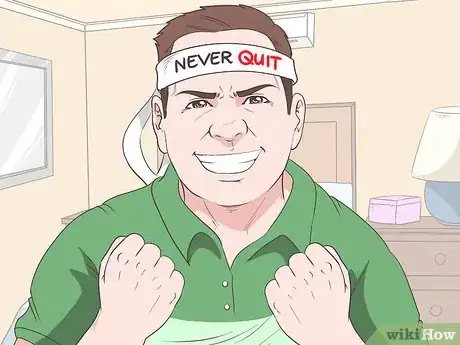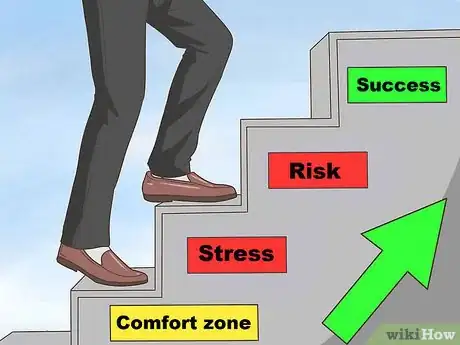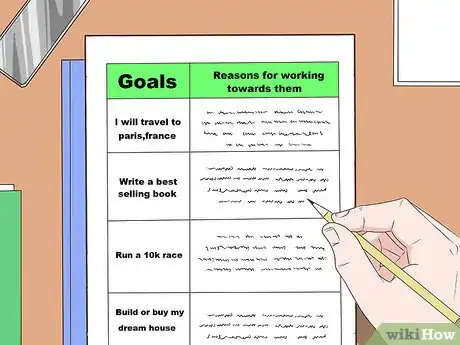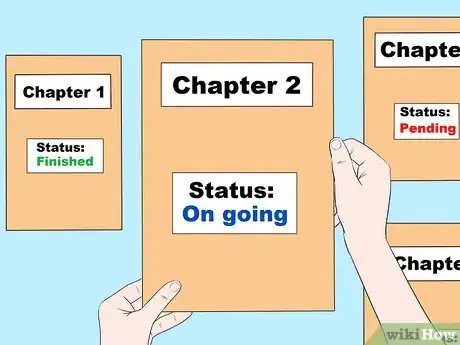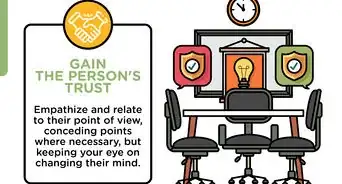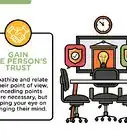This article was co-authored by Leah Morris. Leah Morris is a Life and Relationship Transition coach and the owner of Life Remade, a holistic personal coaching service. With over three years as a professional coach, she specializes in guiding people as they move through both short-term and long-term life transitions. Leah holds a BA in Organizational Communication from California State University, Chico and is a certified Transformational Life Coach through the Southwest Institute for Healing Arts.
There are 12 references cited in this article, which can be found at the bottom of the page.
This article has been viewed 72,185 times.
Whether it is finishing your homework, calling an old friend, applying to college, or pursuing a life-long dream, you might find it hard to act. Procrastination tends to be based on emotions like fear and low self-esteem, encouraging avoidance and even reinforcing doubts about one’s abilities and worth.[1] To convince yourself to act and get past procrastination you will need some strategies. It is time to cultivate a belief in yourself, to harness your inner potential, and to coax yourself into action.
Steps
Changing your Mindset
-
1Limit negative thoughts. Negative thoughts tend to fixate on negative outcomes.[2] You may be selling yourself short, underrating your skills or innate talents to the point that you doom your efforts before even trying, creating a vicious and self-fulfilling circle of failure. Concentrate on empowering thoughts. Part of the process is learning to let recognize what lies behind your negativity, to “let go,” and to replace the negative thought with a positive one. Instead of fretting about how a task, ask what it is that causes you to fret. Is it fear of failure? Loss of control? Once you identify the source, you can better control your reaction.[3]
-
2Don’t fear failure. We all fail. More than that, we fail all the time. In fact, the most successful people fail the most because they take the most risks and learn from prior failures. Consider Abraham Lincoln, who failed as a business owner, went bankrupt twice, and lost 26 campaigns before finding his political form. Consider Thomas Edison, whose teachers said that he was “too stupid to learn anything” and who got fired from his first two jobs for being “non-productive.”[4] Achieving major goals in life involves “unlearning” our fear of failure. One way to do this is to try new things – yoga, painting, music – and to retrain your brain by courting failure in order to overcome it.Advertisement
-
3Banish the word “quit” from your vocabulary. Along with accepting mistakes, adopt a never-say-die attitude toward your goals. Theodore Roosevelt once said that “Nothing in the world is worth having unless it means effort, pain, and difficulty.”[5] Remember that achievement is supposed to come hard and that you do not have a right to easy success, and put on a brave face when you struggle or fail.
-
4Don’t compare yourself with others. There will always be someone in the world who is smarter, more accomplished, more successful, and more popular than you. Judging yourself by their standard is hopeless and will only reduce your motivation and make you feel inadequate. Recognize that these feelings come from within you – you make the comparison and create the feeling of inadequacy; they do not “make” you feel that way. Try to reason in this way. Likewise, you can plan strategically to stop yourself from making comparisons. For example, sit in the front of the class if yoga makes you painfully self-conscious about your body. Just don’t look at your classmates.[6]
-
5Don’t fret about what others think of you. Successful people dare to take risks regardless of what other people think. You may be holding back for fear that you might not fit in or that peers may doubt you, that they will look askance at you or tell you that you will fail. They might be right. But what if they are wrong? One way to manage thoughts like these is by creating a hierarchy. List the people whose opinions really mean the most to you: your family, your parents, your spouse. Then move down the list in descending order of importance. Your boss and friends should matter somewhat less than family, and your colleagues less. By the time you get to casual acquaintances and strangers, you will see that their good opinion should really not matter to you much at all.[7]
Harnessing your Inner Potential
-
1Examine your motivations.[8] What is it that you want to do? Are you aiming to go to college? Do you have an ambition to move to the big city or to patent an invention? Examine your goals. Know what they are and how to achieve them. Try putting your thoughts on paper. What are your exact goals? When do you want to meet them? How do you intend to meet them? Create a reasonable timeline, as well. This will make your plans concrete and give you needed staying power.[9]
-
2Think big, but also realistically. If you set low expectations, you can usually expect to get a lower return for your efforts. Big payoffs come with bigger expectations, more ambitious dreams, and higher risk. You might be content to get into a mid-level college, for example, but why not aim higher? Could you land a spot at an elite school or even get a scholarship? Try it. The risks are quite minimal compared to the potential payoff. At the same time, keep your expectations within reasonable limits. That childhood dream of becoming president, or a professional athlete, or a famous actress will probably not pan out, for the reason that very few people achieve these things. [10]
-
3Leave your comfort zone. Inertia may be keeping you from great things. It is easy to get stuck in a routine, a mental space where you feel comfortable, safe, and unstressed. But it can also stunt you. Risk and stress are two things that can help us to grow. While staying in your comfort zone might mean steady, consistent performance, leaving it gives you the chance to do new and creative things and to reach new heights. Try to change your relationship with “discomfort.” Instead of seeing it as something to avoid, tell yourself that discomfort is a prerequisite for growth. Your comfort, then, may be a sign of a well-worn rut.[11]
-
4Spend time every day in self-development. How much time do you spend learning or improving your mind? Do you realize that this is a habit of successful people? Do you realize that knowledge is power? Try to develop new ideas and skills as another way to avoid becoming complacent in life. Set aside time each day to enrich yourself, even if only an hour – consider it spiritual and mental food. Read good books, read the newspaper, listen to inspiring tapes, take an interest in ideas and be curious about the world.
-
5Remember past success. Remind yourself of past successes rather than past failures. Use a journal to mark and celebrate things that went your way, so that you can have a tangible record. While you should live in the moment instead of in the past, revisit your triumphs from time to time as a way to stay motivated.[12]
Giving yourself Incentives
-
1Write down your goals.[13] Put your goals and your reasons for working towards them on paper. A biology student might find it easy to become tired and discouraged in her studies. Remembering why she is in school – because she wants to develop life-saving drugs or be a teacher like the one who first inspired her – is a powerful motivator. Tape your goals to the wall of your office, to your computer, or to your bedroom or bathroom mirror. Keep them in a place where you’ll be frequently reminded of them. This will keep focused and stay on track.[14]
-
2Move the goalposts. Having a large and specific goal can motivate you more than a series of smaller goals. At the same time, however, your central ambition might sometimes seem far away or like an impossibly huge task. Don’t let yourself be overwhelmed. This sort of thinking is known to kill motivation and lead people to abandon projects. Move the goalposts when you feel this way. If you are writing a novel, for example, put the big picture to the side for a while and work on the current chapter or on revising 20 pages per day. Focusing on small, concrete tasks will move you ahead incrementally and help you finish what you have started.
-
3Make a deal with yourself. Chronic procrastinators sometimes need more concrete incentives. Set performance standards and reward yourself. The deals can be small or large. Treat yourself to a short break once you have finished some work. Did you ace your year-end exams? That calls for a bigger reward: take a weekend off to celebrate with your friends. Try to use inducements that will motivate you to follow through.
-
4Consider the best-case and worst-case scenarios. Stop and think: what is absolute best that can happen if you go through with your plans? What is the absolute worst? If you are really committed to a goal, remind yourself of how much you potentially stand to gain by following through or how much you potentially stand to lose by failing. Weight the two. What can you expect from applying for jobs in your dream field of architecture? What is the worst that can happen if it doesn’t pan out? Most times the worst-case scenario boils down to fear – fear of failure, fear of rejection, or fear of regret – while the upside promises very tangible benefits.[15]
Expert Q&A
-
QuestionHow can I be more confident to take large leaps in life?
 Leah MorrisLeah Morris is a Life and Relationship Transition coach and the owner of Life Remade, a holistic personal coaching service. With over three years as a professional coach, she specializes in guiding people as they move through both short-term and long-term life transitions. Leah holds a BA in Organizational Communication from California State University, Chico and is a certified Transformational Life Coach through the Southwest Institute for Healing Arts.
Leah MorrisLeah Morris is a Life and Relationship Transition coach and the owner of Life Remade, a holistic personal coaching service. With over three years as a professional coach, she specializes in guiding people as they move through both short-term and long-term life transitions. Leah holds a BA in Organizational Communication from California State University, Chico and is a certified Transformational Life Coach through the Southwest Institute for Healing Arts.
Life Coach To be confident in yourself, you need to know yourself well, have a plan, and consistently take small actions to achieve your goals. When you follow through with your goals, it helps you build the confidence and trust you need to take those big leaps.
To be confident in yourself, you need to know yourself well, have a plan, and consistently take small actions to achieve your goals. When you follow through with your goals, it helps you build the confidence and trust you need to take those big leaps.
References
- ↑ http://psychcentral.com/library/procrastination.html
- ↑ http://psychcentral.com/lib/becoming-aware-of-your-depressive-thoughts//
- ↑ http://psychcentral.com/lib/replacing-your-negative-thoughts//
- ↑ http://www.uky.edu/~eushe2/Pajares/OnFailingG.html
- ↑ http://www.goodreads.com/quotes/312751-nothing-in-the-world-is-worth-having-or-worth-doing
- ↑ https://www.psychologytoday.com/blog/your-neurochemical-self/201412/can-we-stop-comparing-ourselves-others
- ↑ https://www.psychologytoday.com/blog/fighting-fear/201306/caring-what-other-people-think
- ↑ Leah Morris. Life Coach. Expert Interview. 19 June 2020.
- ↑ https://www.positivityblog.com/25-simple-ways-to-motivate-yourself
- ↑ https://www.psychologytoday.com/blog/do-the-right-thing/201302/dream-big-be-realistic-successful-life
- ↑ https://www.psychologytoday.com/blog/shift-mind/201108/breaking-free-your-comfort-zone
- ↑ https://www.positivityblog.com/25-simple-ways-to-motivate-yourself
- ↑ Leah Morris. Life Coach. Expert Interview. 19 June 2020.
- ↑ https://www.positivityblog.com/25-simple-ways-to-motivate-yourself
- ↑ http://www.forbes.com/sites/actiontrumpseverything/2014/03/01/17-ways-to-motivate-yourself-to-do-great-things/
- ↑ Leah Morris. Life Coach. Expert Interview. 19 June 2020.


